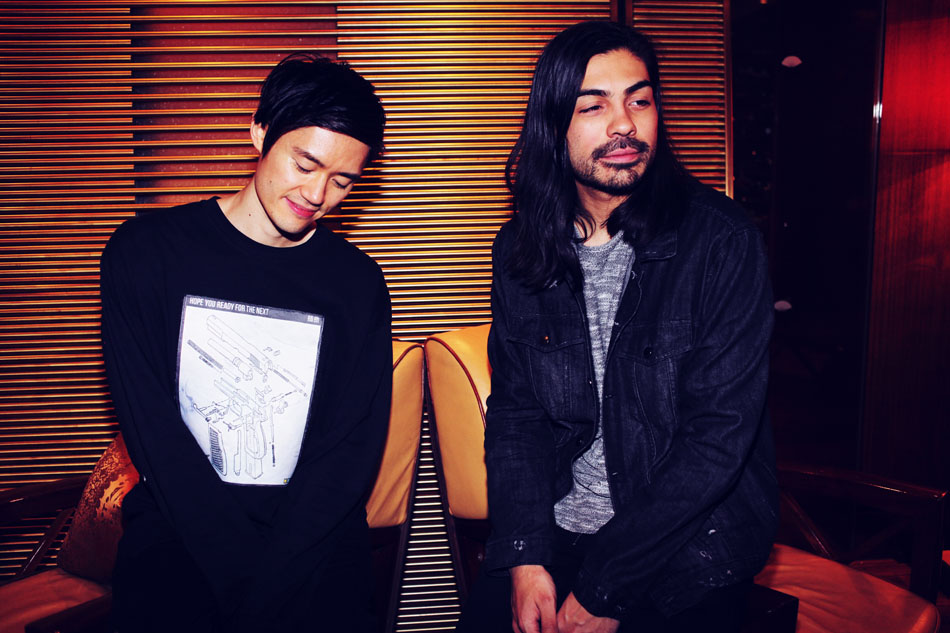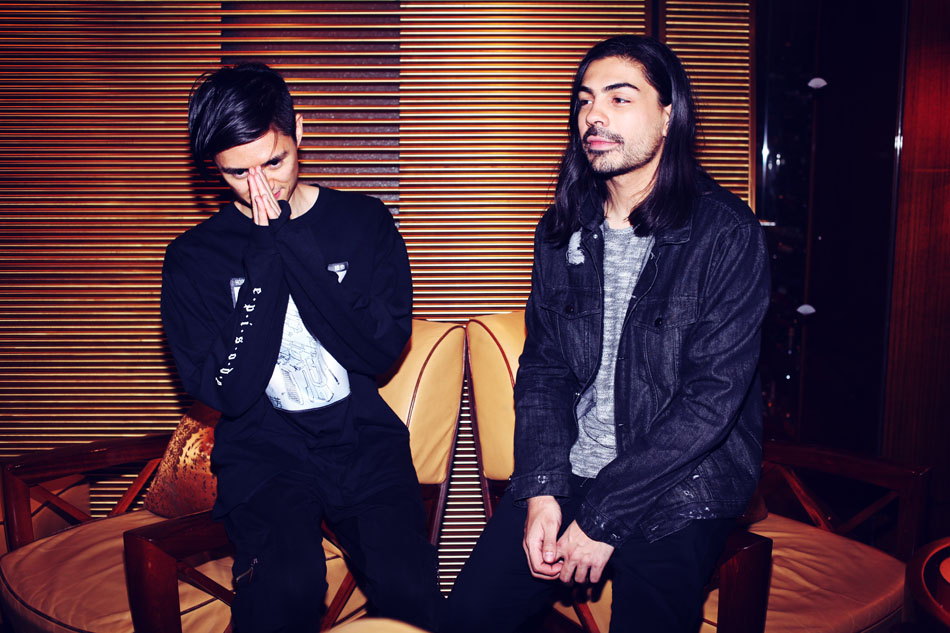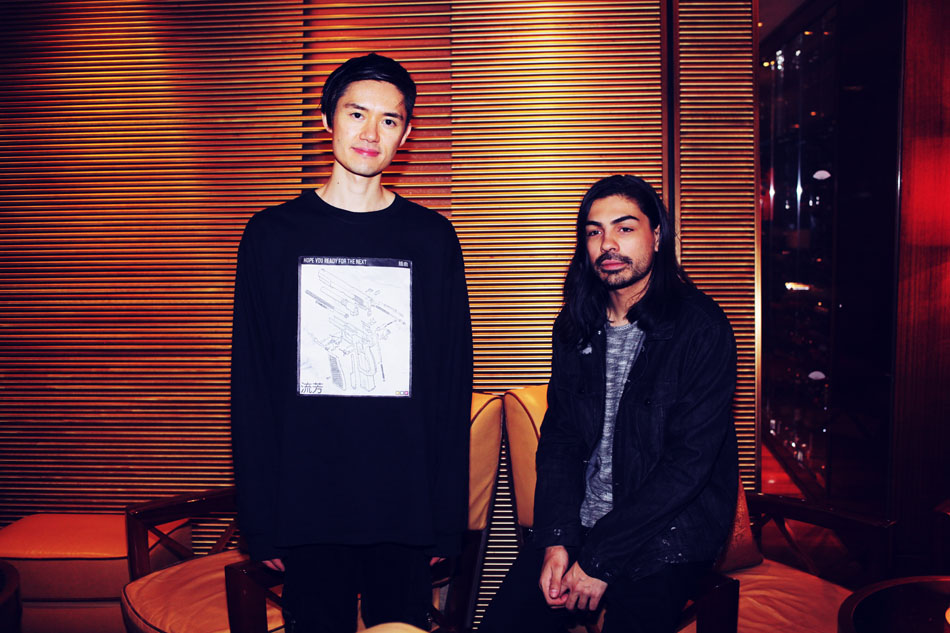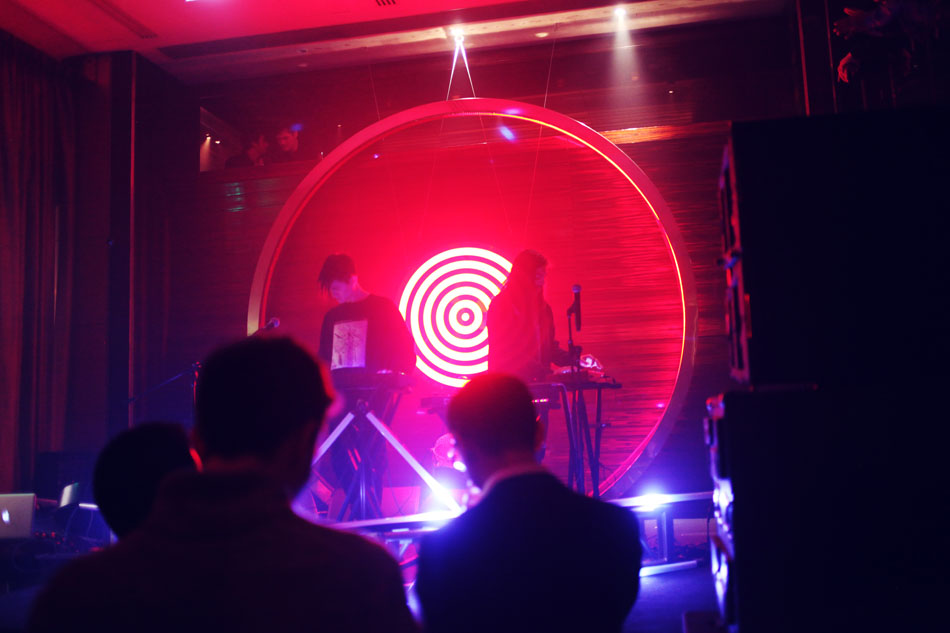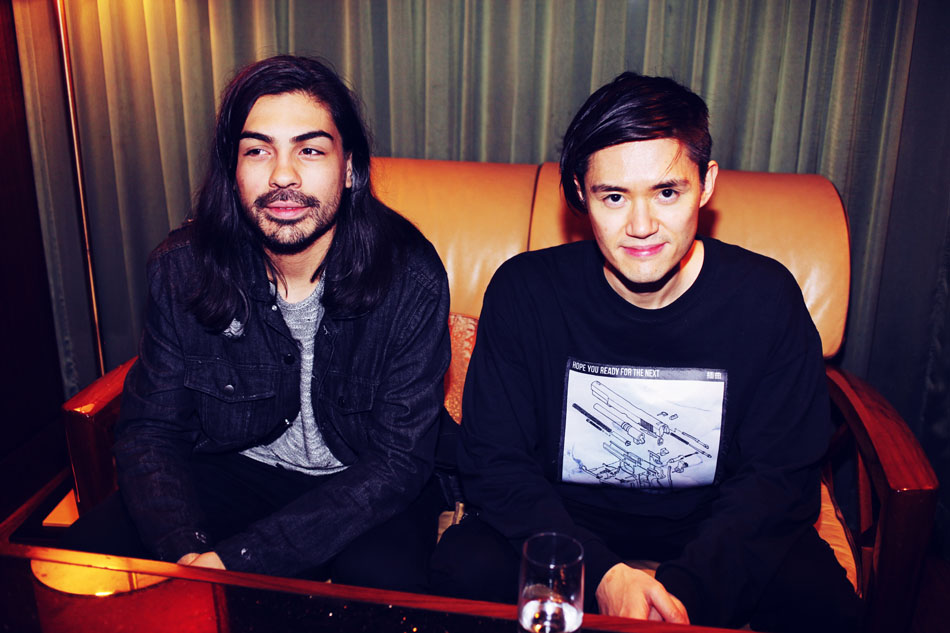Meet the creative trio Autograf who mixes all different art forms-predominantly music but also art and fashion. On their Asia tour they drop by in Hong Kong where we had a chat with them.
Photography and Interview by Lauren Engel
Location: Landmark Mandarin Oriental in Hong Kong
Were you creative people growing up?
M: I wasn’t no, but I was into visual arts before.
L: He would say he was the hipster of the group. I was the bro, the Asian bro.
What were you into back then?
L: Sports. laughs. I mean I was 5’7 130pounds and I wasn’t good at anything sports wise. I grew up in Virginia, Mid West. I played some instruments when I was younger and was really into guitar and I played the violin even though I was not so much into it. Btw it’s actually not a Vietnamese thing though to force your kids to learn piano and violin for instance and I feel like that’s more developed Asian countries that do that. My parents didn´t really have that luxury of modern societies to have hobbies or to make their children live with the concept of extracurricular activities, and so they just let me play around outside in the “dirt.” laughs.
“I don’t want to be remembered. I feel like that’s what gets humanity in trouble, people want to leave a legacy, then you have all these assholes doing asshole things to have a statue in the middle of the park when they’re dead. I’m just not into that.”
Are your parents creative people?
L: My dad is a poet, he writes songs and plays the guitar. He did that when he was younger and then he came to the US and had to raise a family so he became an engineer. He came to the States to study and then he was planning to go back when he graduated but that’s when the fall of Saigon happened and everyone was fleeing Vietnam so they all just stayed here. My mom is a creative person nowadays and she plays the piano and sings in her free time.
What kind of music did you listen to growing up?
L: Because I was playing the guitar I was listening to a lot of Pink Floyd, ripping off solos like David Gillmore, not that I was really able to but as a younger person that’s what I really dreamed of.
M: I grew up with metal in high school.
What kind of music did your parents listen to at home?
M: Classic rock stuff.
L: You know here comes to my mind that I feel a lot of people love listening to music when they are young and they start in creative fields but then life forces them to other areas and they forget about the other stuff.
Do you think that’s what’s going to happen to you?
L: No..I feel the opposite. laughs. After college I got “a real job”. I studied economics and then I went to work for a trading company, trading stock options. I remember when we were on tour with the rest of the guys, we had a photographer and tour manager with us and I was sitting there reading the Wall Street Journal and he’s like putting that image on his snapchat thinking it’s funny. laughs. After that at one point I became obsessed about DJing. Life kind of takes you on those twists.
M: I owned a gallery before music showed up in my life. Initially I went to an advertising and design school and worked in advertising for a while but at the end I wanted to end up somewhere where I had more control. And then music just happened.
“You know here comes to my mind that I feel a lot of people love listening to music when they are young and they start in creative fields but then life forces them to other areas and they forget about the other stuff.”
Have your parents been always supportive of your careers?
L: No, they have not always been. They are those kind of parents that wanted their kids to be doctors and they thought I had a good job and when one day I quit it to focus on DJing, they just couldn´t understand it and they didn’t approve of that. It took them a long time. But now they are proud and they even ask me if they can come to a show. My mum is always telling me to take vocal lessons but I am not interested in singing to be honest.
M: It would help a lot though. laughs. My mom wanted me to go into the science field, environmental science. I got a scholarship for it actually but then I changed majors.
What do you do besides of music?
L: I feel like this is all we do. This is our fulltime job. I feel like we don’t work 40 hour weeks, we work 100 hours weeks. It’s both our hobbies and passion which is cool. I don’t feel like it’s work anymore and I guess our free time just comes with it and is about traveling and trying to see the world.
M: Eat good food.
Was it difficult “to grow” at the beginning?
L: I don’t even think it was a goal. We just did what we thought was cool and different and we just started putting out tracks and whatever happened then was not something we expected. We had a previous project before Autograf so that taught us a lot of stuff. When we started Autograf, we just knew what you’re supposed to do. It was supposed to be an art project so we started out making art and then music took off faster and consumed us and here we are. It’s mostly a music project now but we also started our own clothing line. It was always meant to be a fun hobby but when you have success in one area it takes over your life.
What would you say was the turning point where you said lets put all our energies in here?
M: The first event we did was called Warhol factory where we incorporated pop art and music together and probably spent a month planning that out and organizing it so it ate up a lot of time and then it was just one of those things that kept snowballing.
Were you ever worried being a trio that you guys would ever fall out?
L: I knew that Jake was just pretty easy to work with and I’ve been working with Mikhul for a while so I knew that was easy too. It wasn’t really an issue. We’re all pretty chilled.
Do you think you would ever branch off and do your own thing?
L: Probably not. Right now I just feel like there’s so much to do in life and who knows what I am doing in a few years. Maybe I’ll get really into origami.
Did you have inspirations for your art installations?
M: The first event was really pop art and about a modern twist on that. That one was Warhol based. That’s btw the great thing about having three people in the group; criticism and we trust each others opinion. We give each other feedback and therefore inspiration.
L: A lot of it is just about random things that we’re into. We just decided to build a live show, a stage set up. We didn’t plan for it to go that way. The idea for the first Warhol factory was to do the whole boiler room DJ party meets art installation, then somehow we added one instrument in the beginning and then kept adding more and more. Now we have ALL this gear to carry around the world. Sometimes we’re like: Why do we do this to ourselves.
M: Ya, we wished we just had a USB stick. laughs.
“Go make a mark, go make an impact. Everything you do has a small impact initially, but in the end it has a massive impact on the world.”
How do you feel like you have matured as a group since you put out your first song?
L: Have we matured?! Laughs. I’m not sure.
M: Musically we have tried a bunch of stuff.
L: Ya I would say most people in the electronic world are all over the place because that’s the beauty of electronic music that it’s not stale. People are always jumping around between sounds and genres because it’s fun to do that. It’s not fun to just make the same type of music. I think if you look at it, it’s a bit of ADD when it comes to how the project evolves musically. I’d say that things got real. In the beginning it was just all fun. Now there’s schedules we have to adhere to like an interview. Interview before the show, interview after the show.
M: Don’t miss that flight. laughs.
L: So I think as you grow you have more responsibility and you have to be an adult about what you do. You can’t just get fucked up all the time, show up to shows on acid, run around in your underwear. We haven’t done that but there’s an act that did do that one time. laughs.
Does it ever stress you out especially with electronic type music that it’s very trend based, like who gets booked for what?
M: Seems like if you just want to get booked at clubs you just got to make festival banger music.
L: It’s kind of interesting to see the scene that we grew up in. It started out just really chilled and then it just got heavier and heavier. I feel like the scene started because it was an anti-culture to the heavy bass music in EDM at that time. People got sick of the overly aggressive music so the whole Disclosure thing reset everything with the chill vibey stuff. Then everyone started out with that, but then the same cycle starts again. The heavy bass scene started out as disco, indie electro, indie dance but that just got heavier and heavier. That turned into big room house and dubstep and heavy bass music. Likewise, the scene we started out in which is meant to be the counter culture to all that, the same things happening. I guess that’s what people want. laughs. As artists get bigger they start playing festivals and bigger shows and if you’re a new artist it’s so much fun to drop a track and see everyone go nuts. You drop a heavier track and see it go off and you’re like I need to make more songs like this, this is awesome and it just spirals out of control. Everyone just does it, it’s kind of natural. The festival culture is just pushing that.
M: We start playing out tracks before we put them out so we make adjustments to those tracks and play out different versions.
L: I think most acts do that, they try an unreleased track or a work in progress and see how it plays out. If it goes off, then perfect and if not you have to change something. I think that’s kind of encouraging to make more bangers, for better or for worse. I’m not saying it’s bad, it’s fun. Who doesn’t like to see everyone go nuts. laughs. I have noticed that for a lot of our peers, but for us as well. Our music has gone all over the place as well. It is what it is.
“So I think as you grow you have more responsibility and you have to be an adult about what you do. You can’t just get fucked up all the time, show up to shows on acid, run around in your underwear. We haven’t done that but there’s an act that did do that one time.”
What do you want to be remembered for?
L: I don’t want to be remembered. I feel like that’s what gets humanity in trouble, people want to leave a legacy, then you have all these assholes doing asshole things to have a statue in the middle of the park when they’re dead. I’m just not into that.
M: I just want to enjoy life for what it is right now.
L: Ya I just want to put out positive vibes and encourage people to do positive things in the world. That’s it.
Last question, you’re name is Autograf, if you would anyhow want to leave a legacy, what type of legacy do you want to leave behind?
L: I think the whole message of Autograf is just to encourage people to leave a mark. I feel like everyone has one life, one chance at everything, so don’t waste your time. If you want to do something, if you want to connect with people, if you want to pick up piano lessons, whatever your passion is in life don’t wait around for it. Go make a mark, go make an impact. Everything you do has a small impact initially, but in the end it has a massive impact on the world.
soundcloud.com/AutografMusic


